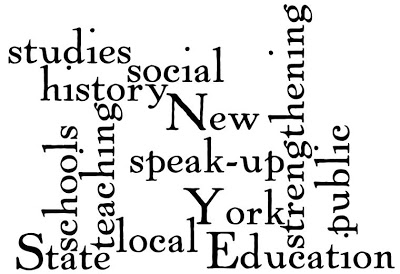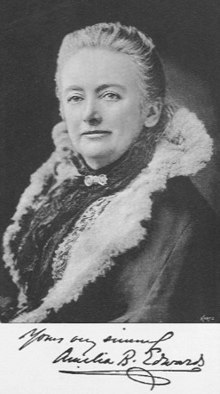
The New York State Board of Regents will be meeting on Monday and Tuesday, April 23-24, in Albany. The meeting overlaps with the Museumwise/MANY conference in Albany which I will be attending and the Public Historians meeting in Long Island which I will not be able to attend since I already had registered for the Albany meeting. Communication and planning among the various groups leaves a lot to be desired.
The Monday morning session of the Regents covers k-12 education. In addition to various charter school items, the agenda includes “Proposal to Create Multiple Pathways to a NYS High School Diploma.” Technically this is not a Core Curriculum item but it does provide an opportunity for the Regents to set the direction of NYS education for the near future and it does include history proposals.
Before turning to the Regents’ proposals, please be aware of an article from the Wall Street Journal, “Students’ Regents Test Scores Bulge at 65” by Barbara Martinez and Tom McGinty, which the New York Council for the Social Studies sent to its (unfortunately too few) members. It paints a stark picture that calls into question the honesty of the test scores even ignoring the issue of their educational validity.
The question arises due to the severe drop-off in the number of students who are graded between 60-64, just below failing, compared to 65-69, just passing. The discrepancy suggests that chance and the bell curve are not at work but that collusion has occurred to help students who come close to passing get that little extra push they need to pass – that push coming from the teachers who are grading the exams who understand what’s at stake, including their own evaluations, even if not directly ordered to assist the students.
Here are some excerpts:
A Wall Street Journal analysis of high-school Regents test scores shows that a disproportionate percentage of New York City students barely got the passing score they needed to receive a diploma in the past two years, while very few received scores just below passing.
For the 2009 English Regents exams, for instance, students were more than five times as likely to get a 65—the minimum passing grade—than they were to score one point below. In the U.S. History and Government Regents, students were 14 times more likely to get a 65 than one point lower. ‘There’s no question that there’s something fishy going on,’ said Jonah Rockoff, a professor at Columbia University’s business school who frequently analyzes schools-related data sets.
In New York state, high-school teachers score their own students’ tests—which differs from tests in most other states, as well as New York’s own third- through eighth-grade tests. Mr. Rockoff, who reviewed the Regents data, said, ‘It looks like teachers are pushing kids over the edge. They are very reluctant to fail a kid who needs just one or two points to pass.’
Based on these studies, it would seem that this skewing only occurs in tests which are graded by the teachers themselves.
Mr. Rockoff points to the eighth-grade math scores in New York City for 2009, which aren’t graded by the students’ own teachers. There is no similar clustering at the break point for passing the test. He estimates that 3% to 4% of the students who passed the Regents test last year should have failed, based on the DOE data. He said teachers have effectively lowered the passing score on Regents tests to 62 or 63.
Regardless of the official denials, the practice appears to like Code Red in the movie A Few Good Men: officially it doesn’t exist but in the real world, everyone knows that it does.
Teachers refer to the practice of lifting test scores as “scrubbing.” After teachers grade tests—many times their own students or those of their colleagues—they set aside tests in which the students just missed passing. Teachers say that is generally from 60 to 64, but can go as low as 57. The teachers then ask the original scorer to take another look at the test to see if an argument could be made for giving the student an extra point or more.
The phenomenon appears to be state-wide so it can not be attributed to the Department of Education in NYC attempting to make Mayor Bloomberg looked good for improving high school graduation rates.
But the concentration around 65s can be seen in other major New York cities, like Albany, Syracuse and Buffalo, where such school-accountability systems don’t exist. Looking at past New York City data, Mr. Rockoff said the patterns around the score of 65 were “just as strong in 2000, so it’s hard to argue that accountability under Bloomberg and Klein pushed teachers to pass more kids.”Here are some history exam examples.
At Sheepshead Bay High School, out of more than 1,100 children who took the U.S. history test last year, 219 got scores from 65 through 68, and only 12 tests were marked with scores from 60 through 64. In the global history exam, out of more than 400 children who took the test, four scored from 60 through 64, while 93 students scored from 65 through 68.
The school’s principal, Reesa Levy, dismissed any suggestion that teachers were purposely moving students to a 65. She said she has never heard of the term ‘scrubbing.’ She said all of her teachers have been “working harder to get up to 65 this year and push to get up to 75” and are “the strictest graders in the entire world.” Ms. Levy said, ‘To our dismay way too many kids failed the exams and we are working to improve the situation.’….
(A)t Fort Hamilton High School, out of just under 1,000 students who took the U.S. history exam in 2010, none scored from 60 through 64, while 139 scored from 65 through 68. In global history, two scored from 60 through 64, while 280 scored from 65 through 68. JoAnn Chester, the principal of Fort Hamilton, declined to comment.
In New York state, most students must pass five Regents tests—English, math, global history, U.S. history and science—in order to receive a high-school diploma.In those subjects, Regents exams have a multiple-choice section and also a part for responses such as essays or showing work in math questions. The state provides a rubric for teachers to guide them about when to give a student a point for reaching certain thresholds in their answers.
‘Going forward,’ the state is moving toward an online computer-based testing and scoring system where responses that require teacher judgment would be randomly assigned to teachers across the state, said John King, deputy commissioner at the state department of education. The state is also working on raising graduation requirements, given that the state has determined that even a 65 doesn’t indicate students are ready for college.
That last comment harkens to the goal of the Common Core curriculum whereby high school students would be ready for college upon graduation. Think of the cost saving to colleges if they could eliminate remedial classes. Think of the chaos in the k-12 system if colleges suddenly did that. In the meantime, the very Regents are under review in the meeting Monday on providing multiple pathways to them including involving American History. The proposals on global history and geography are not included here. Note the attention given to citizenship, a subject of a previous post. Note also the absence of state and local history in the discussion.
Agenda Item NYS Board of Regents
Proposal to Create Multiple Pathways to a NYS High School Diploma Recommendation #3: The Department recommends that the Board continues to require the Regents exam in United States History and Government. Currently, two exams have been identified as Department-approved Alternative Examinations acceptable for meeting the United States History and Government requirement for a Regents Diploma:
• Advanced Placement United States History.
• SAT II United States History.
Students’ lack of knowledge and performance on social studies subject-area assessments has been well-documented nationwide over the past century. The National Council for the Social Studies (NCSS) advocates that a social studies education is about “creating effective citizens.” Yet that focus is seen as diminished with national attention on accountability for other subject-area assessments (i.e., English language arts and mathematics). The Department, in partnership with the NYS Bar Association, has supported the Law, Youth, and Citizenship (LYC) Program to strengthen education in civics, citizenship, and government statewide. While there have been some achievement gains nationwide, American students continue to demonstrate large gaps in their knowledge of United States history and government. For example, results from the 2010 National Assessment of Educational Progress (NAEP) in U.S. History found increased gains since 1994 from the lowest-performing 4th graders and in average scores for 8th and 12th graders.
Scores increased since 2006 for Black, Hispanic, and male eighth-graders. Nevertheless, less than one-quarter of students performed at or above the Proficient level in 2010 (20 percent of 4th graders, 17 percent of 8th graders, and 12 percent of 12th graders)8, and there were no significant changes in percentage of students at the Advanced level. To put it another way, most 4th graders were unable to say why Abraham Lincoln was an important figure, fewer than one-third of 8th graders could identify an important advantage that American forces had over the British in the American Revolution, and less than one quarter of the 12th graders knew that China was North Korea’s ally during the Korean War.
Further, on the 2010 NAEP assessment in Civics, students’ knowledge was also weak11. Only 27 percent of 4th graders, 22 percent of 8th graders, and 24 percent of 12th graders performed at the Proficient level on this examination. Fewer than half of the 8th graders knew the purpose of the Bill of Rights, and three-quarters of the 12th graders were unable to name a power granted to Congress by the Constitution. NAEP results for Civics are not broken down on a state level. New York’s social studies standards typically receive high rankings in national publications. In discussing Recommendation # 1, Recommendation # 2, and Recommendation #3, the following data could be considered:
• 11 of the 25 states with exit examinations for high school diplomas include a history/social studies test in exit examinations or as a required end of course (“EOC”) examination.
• Texas currently implements three separate EOC examinations in social studies: U.S. History, World History, and World Geography. It is the only state besides New York with a separate EOC exam in World History and Geography.
• Massachusetts was scheduled to offer History and Social Science assessments that included world history beginning in the 2010-11 school year, but they were suspended due to a lack of funding.
• New York is the only state with a separate essay component (the Document-Based Question, or DBQ). Other state EOC exams weigh heavily on multiple-choice questions, and occasionally constructed-response questions. New York already incorporates the Common Core State Standards into the DBQ essay, which requires students to analyze a series of documents and use their knowledge of social studies in order to address a specific topic. The DBQ – a long-time feature on the Advanced Placement (AP) examinations – is a hallmark of the New York State social studies testing program.
What is the role of the New York State History community in this discussion? Not what has been the role of the New York State History community in this discussion, but what should it be? And even if the community did want to participate, what are the mechanisms whereby it could do so? Perhaps these will be topics of discussion at the two history conferences this week.
Peter Feinman founder and president of the Institute of History, Archaeology, and Education, a non-profit organization which provides enrichment programs for schools, professional development program for teachers, public programs including leading Historyhostels and Teacherhostels to the historic sites in the state, promotes county history conferences and the more effective use of New York State Heritage Weekend and the Ramble.






The mayor should change the grading system to its old ways or lower the passing grade for U.S History Regents. Why do we need regents can’t we just have finals like other states. Regents isn’t easy.
The idea of an education is to learn something. Not simply easily pass tests.